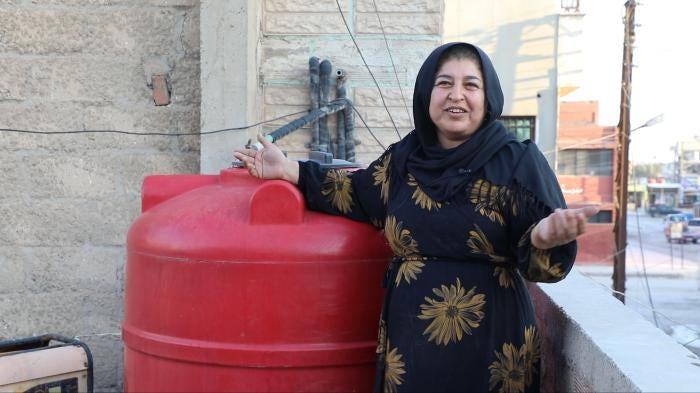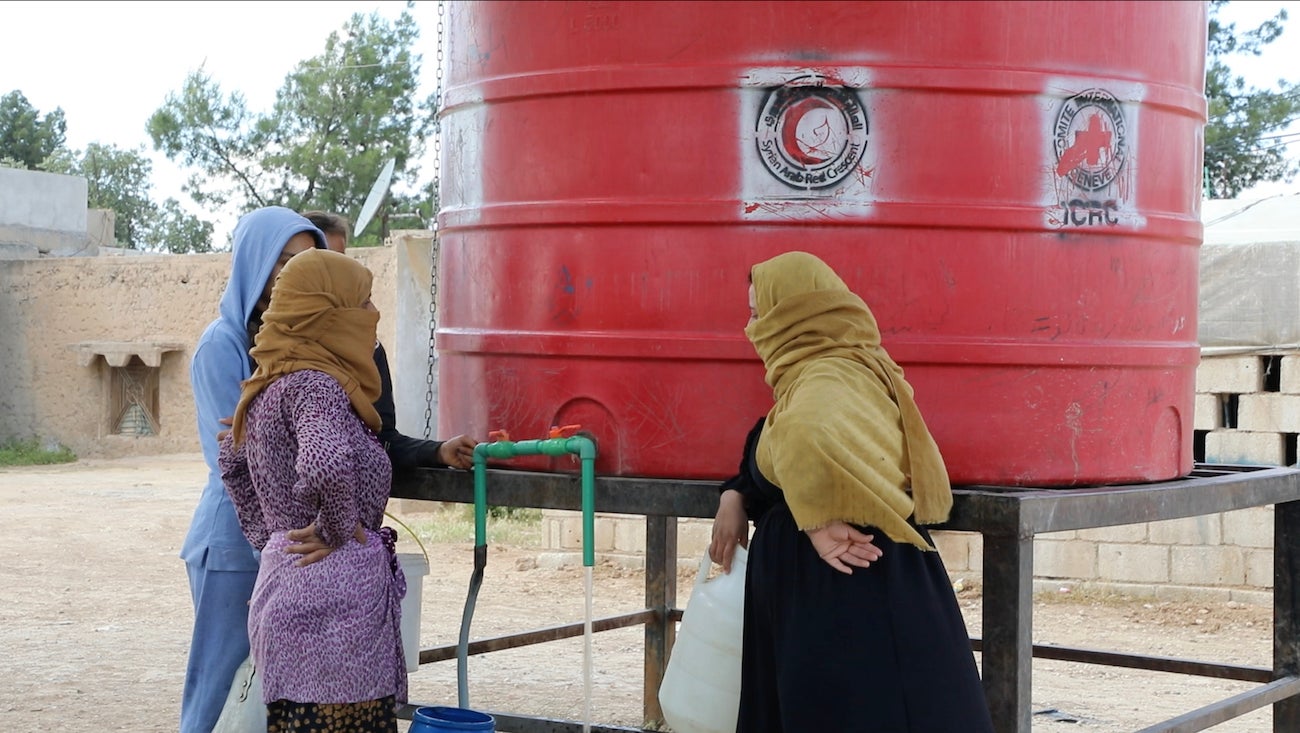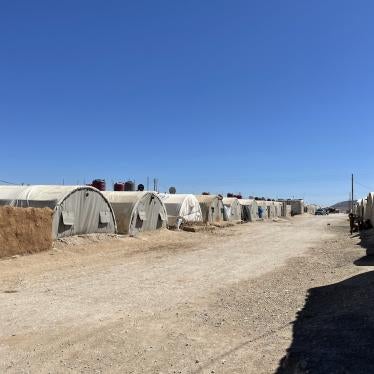- Recent Turkish drone strikes on Kurdish-held areas of northeast Syria damaged critical infrastructure and resulted in water and electricity disruptions for millions of people.
- People in the region, already facing a severe water crisis, now also bear the brunt of increased bombardment, exacerbating their struggle to get essential water supplies.
- Turkey should urgently stop targeting critical infrastructure necessary for residents’ rights and well-being, including power and water stations.
(Beirut, October 26, 2023) – Drone strikes by Turkish Armed Forces on Kurdish-held areas of northeast Syria between October 5 and 10, 2023, damaged critical infrastructure and resulted in water and electricity disruptions for millions of people, Human Rights Watch said today.
The strikes on more than 150 locations in north and east Syria in the governorates of al-Hasakeh, Raqqa, and Aleppo, killed dozens of people including civilians, and damaged civilian structures, civic groups said. The Kurdish-led Autonomous Administration of North and East Syria, which governs the targeted areas, confirmed that the attacks on water and electrical power stations, resulted in the “complete cutoff of electricity and water supply” from al-Hasakeh governorate. Critical oil installations and the only operational gas plant for domestic use in northeast Syria were also damaged by the attacks. In the city of al-Hasakeh, an ongoing water dispute since Turkey’s 2019 invasion of parts of northern Syria has already been jeopardizing the right to water for nearly a million people, including residents and displaced communities.
"By targeting critical infrastructure across northeast Syria, including power and water stations, Turkey has flouted its responsibility to ensure that its military actions do not aggravate the region's already dire humanitarian crisis.” said Adam Coogle, deputy Middle East director at Human Rights Watch. “People in al-Hasakeh city and its surroundings, already facing a severe water crisis for the past four years, must now also bear the brunt of increased bombardment and destruction, exacerbating their struggle to get essential water supplies.”
Turkey greatly escalated its ongoing drone strikes on Kurdish-held areas of northern Syria after a group affiliated with the armed Kurdistan Workers’ Party (PKK) said it had carried out an October 2 suicide attack on the entrance to the Interior Ministry in the Turkish capital, Ankara, injuring two policemen. Turkey declared on October 4 that infrastructure, superstructure, and energy facilities in Syria and Iraq were legitimate targets for security forces, armed forces, and intelligence elements. Turkey, the EU, and the US deem the PKK a proscribed terrorist group, and Turkey regards the US-backed Syrian Democratic Forces and the autonomous administration, which is the region’s governing body, as the PKK’s close affiliate.
According to the autonomous administration, damage to infrastructure caused by attacks that took place between October 5 and 10 impacted an estimated 4.3 million people in northeast Syria with at least 18 water pumping stations and 11 power stations rendered non-operational.
The electrical power facilities targeted include the Sweidiya power plant, a vital electricity source for over one million people, and the north Qamishli electricity transfer station, supporting 40,000 families. The attacks left these critical facilities unable to operate, resulting in a total disruption to both power and water supply services, as of October 18.
Both the al-Gharbi dam transfer station in al-Hasakeh, typically catering to over 20,000 families, and the Amuda transfer station, serving 30,000 families, also remained inoperative as of October 18 following attacks that caused damage to them on October 5. The Amuda transfer station is also responsible for supplying power to Derbasiya transfer station, which in turn powers the Alouk water station.
Alouk station has over the past four years faced recurring disruptions even before the recent damage.
Turkey and the autonomous administration repeatedly failed to reach a durable solution to ensure that the embattled Alouk station in the occupied Ras al-Ain (Serekaniye) district of Syria, which supplies Kurdish-governed al-Hasakeh city and its environs, operates at optimal capacity and without interruption.
Because of these disruptions, communities that usually depend on the station are instead forced to rely in large part on expensive – and often poor-quality and untested – water from unregulated privately owned trucks, the local water authority said. An al-Hasakeh resident said the water they received from private trucks “was yellow and looked rusty.”
This has given rise to poor sanitation and outbreaks of water-borne illnesses and disease, including cholera in September 2022, they said. An emergency doctor at al-Hasakeh hospital said that, between April 9 and May 9 alone, 104 cases of people with acute diarrhea, which may be caused by a water-borne disease, were admitted to the hospital, and 84 cases with gastric infections. The hospital only has a capacity for 50 to 60 such cases, so some have had to be turned away. A doctor said that the hospital’s kidney dialysis center was particularly affected because it needs a continuous supply of purified water.
Prior to strikes by Turkey in October, the UN had determined that a staggering two-thirds of the country’s water treatment facilities, half of its pumping stations, and a third of its water towers had been damaged in hostilities since 2011, contributing to a severe water crisis across Syria in addition to drought, and energy shortages.
The October 2023 strikes are also not the first time Turkey appears to have intentionally targeted civilian infrastructure. Airstrikes in November 2022 also inflicted damage on densely populated areas and critical infrastructure.
Under the laws of war, Turkey and other parties to an armed conflict must not attack, destroy, remove, or make useless objects indispensable to the civilian population’s survival, including for water distribution and sanitation. Governments and de facto authorities are obligated to realize the right to water by ensuring that people under their jurisdiction or other responsibility have access to sufficient, safe, acceptable, physically accessible, and affordable water for personal and domestic uses. They are also required to refrain from interfering, directly or indirectly, with the right to water in other countries.
Turkey should ensure that Alouk water station operates at optimum capacity without purposeful interruptions to water pumping and should guarantee regular access for qualified repair and maintenance teams. Turkey and other parties to the conflict should also engage with the UN’s ongoing efforts to facilitate approval of a monitoring mechanism, and adequate operational and maintenance capacity of Alouk water station and Derbasiyeh electricity substation. The autonomous administration should refrain from purposeful electricity cuts and ensure sufficient electricity to power Alouk station.
Alouk Water Station
Alouk water station fell under Turkish control following Turkey’s 2019 military incursion into northeast Syria. Since then, the people in the Kurdish-held region have experienced lengthy interruptions in their water supply, with Turkey failing to operate the station at full capacity and the Kurdish-led Autonomous Administration withholding electricity needed to power the station.
Lack of safe and sufficient water supply for drinking, cooking, hygiene, and sanitation has led people to turn to unsafe water sources, increasing water-borne health risks such as cholera.
Human Rights Watch researchers visited al-Hasakeh governorate in May 2023 and met with officials of the Kurdish-led Autonomous Administration, Syrian engineers, aid workers, and water specialists. Researchers also met with residents of al-Hasakeh city and displaced Syrians in private housing, camps, and shelters. They also visited the al-Himmeh water treatment station and viewed boreholes used by local authorities and private truck owners to extract water as an emergency measure.
Human Rights Watch in September wrote to the United Nations, which provided detailed responses, and to Turkish authorities, who responded saying that the neglect of water infrastructure by entities in Syria and electricity cuts by Kurdish-led authorities led to Alouk station operating at reduced capacity.
The United Nations, water experts, aid workers, and autonomous administration representatives said that Alouk station in the Turkish-occupied region – when operating at optimal capacity – is the only viable long-term option to ensure sufficient safe drinking water for al-Hasakeh city, in the Kurdish-controlled region, and its surroundings.
Alouk station has 34 wells and 12 pumps, of which at least 6 need to be in operation at the same time to pump enough water, but according to UN sources and local authorities and experts, Turkish authorities sometimes operate as few as 2 to 4 at a time.
As a result, the water flow is intermittent and insufficient to cover the needs of residents, many of whom already face significant hardship. They include hundreds of thousands of internally displaced people living mostly in overstretched and under-resourced camps and temporary shelters, some of which do not receive sustained or sufficient aid.
Local officials said that the water runs through a 67-kilometer pipeline from Alouk station, in the Turkish-occupied region, to al-Himmeh station, near al-Hasakeh city, in the Kurdish-controlled region. When operating optimally, Alouk station provides water to all neighborhoods in al-Hasakeh city linked to the water network, in addition to more than 200 villages and the town of Tal Tamer, according to local water officials. According to the UN, it also provides water to al-Hol, Areesha, and al-Roj camps for displaced people.
An artillery strike on October 9, 2019, hit areas around Alouk station and damaged electricity cables, and as a result the station ceased operations for an entire month. Since November 17, 2019, Alouk station has been out of operation nearly 45 percent of the time, and has operated at below half of its capacity another 41 percent of the time, based on aid agency statistics.
In addition to strikes that affected the operation of Alouk, Turkey has frequently cut off the water supply from Alouk station, including during the Covid-19 emergency in 2020.
Electricity to operate Alouk station is provided by the Derbasiyeh electricity substation, controlled by the autonomous administration. At 50 kilometers from Alouk, it is the closest power plant to Ras al-Ain district, yet the electricity reaching Alouk has often been “of bad quality or insufficient” to adequately run the plant, an expert with relevant knowledge said.
Local authorities in the Kurdish-controlled region said that they had cut electricity to Alouk because of disagreements with the Turkish authorities, including over the quantities of electricity they supply to operate Alouk in return for water. Electricity consumption by Turkish authorities far exceeds the amounts allocated to operate Alouk, resulting in malfunctioning of the power station, they said.
In their response to Human Rights Watch, the Turkish authorities accused the Kurdish-led administration of not providing electricity to the Tel Abyad and Ras al-Ain regions. In February 2021, the local councils of Tel Abyad and Ras al-Ain signed an agreement with the Turkish AK Energy company to provide electricity to their respective areas.
Local authorities said that in April 2023, the United Nations Children Fund (UNICEF) mediated between Turkey and the autonomous administration to provide electricity in exchange for water from Alouk, yet the results were inconsistent. Previous attempts by Russia to broker an agreement have repeatedly failed.
The UN said that an agreement in late 2019 between Russia and Turkey contributed to intermittent access for qualified technical teams from the Syrian government, until August 2022, but since then, neither the Syrian government, nor local Kurdish-led authorities have had access to Alouk station due to the unresolved disputes. A Turkish private-sector contractor operates the water station and is responsible for its maintenance, the UN said.
Unprecedented reduced water levels at Tishrin and Tabqa dams on the Euphrates river, which is the most significant source of water and electricity for northeast Syria and other parts of the country, have affected electricity production, the UN said. While low groundwater and rainfall levels are partly to blame, Turkey has also severely restricted the flow of water downstream to the Syrian-held portion of the river to well beneath the 500 cubic meters stipulated by a 1987 agreement between Turkey and Syria. In its response to Human Rights Watch, Turkey blamed the plummeting water levels of the Euphrates river on climate change and drought alone.
Other problems, water experts and local authorities said, include the unaddressed, yet prevalent, practice of illegal connections along the electricity lines leading to Alouk station and the water pipeline from Alouk station to al-Himmeh station in both the Turkish-controlled and autonomous administration-governed regions for agricultural projects.









